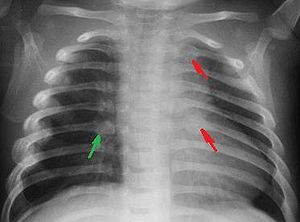 |
| English: Rib fractures in an infant secondary to child abuse (Photo credit: Wikipedia) |
By Lawrence W. Daly, MSc
Forensic Expert – Senior Author
A crime occurs and generally there are three types of people involved in an alleged crime; the complainant who is generally the victim, the perpetrator who is generally the individual who committed the crime, the witness who by one of his senses (e.g. saw the crime occur, heard it, and etc.) became involved in the alleged crime. Law enforcement is called to respond to the event and investigate the alleged event to determine if a crime occurred. Depending on the evidence and facts of the case the officer begins to compile any and all information about the alleged event. Depending on the seriousness of the alleged event the first responder may request assistance from other reactive patrol units, supervisors, and the major crimes division.
The first responder will either handle the investigation or turn the case in for additional follow-up. Once the information is gathered by the first responder he will have to make immediate decisions about what steps he must take to protect evidence and those individuals who may have either participated in the alleged crime or became involved because they were in the right spot at the wrong time.
When it comes to serious crimes such as robberies, homicides, child rapes, and arson the first responder would request his sergeant to respond to the scene, advise him of his findings and request the sergeant to call out the detective(s) who work within the specialized area of expertise i.e. the type of crime. If the detective decides to respond to the alleged crime scene, then upon his arrival he will take charge of the investigation.
It will take many hours for the detective to perform his functions as a thorough, competent, and intelligent investigator. The detective will need to understand all aspects of the alleged crime. One of the first tasks the detective must determine is if in fact a crime was committed. If the facts and evidence do not support that an event which did occur but wasn’t criminal the investigator will close out the case.
The decision of which investigative steps should be taken by the detective is predicated upon what is apparent, obvious, easy to understand, and presents little to no critical thinking. The investigative steps the detective will take generally is acquired from the basic crime scene investigation workshop. Detectives are generally required to participate in these types of workshops if an officer intends on becoming a detective.
The areas which need to be explored and developed specifically deal with the information retrieved from the parties at the event that a crime did or didn’t occur. However, in child sexual abuse cases, there will be witnesses who are involved in the case. This is where a competent and intelligent detective can make a difference in ascertaining the facts about the allegations. One of the greatest
problems are detectives believe they only are to interview the complainant, the suspect, and a witness.
In gathering the facts most law enforcement officers make the mistake by failing to understand, identify, or reasonably conclude when the actual complaint began. In a recent child sexual abuse allegation where a man was criminally charged for allegedly raping his granddaughter law enforcement began their investigation at the middle of the complaint. The training and education law enforcement officers do not instruct them in how to develop what the ‘motive’ was for the child and complainant to make such serious allegations. Failure to understand the ‘motive’ puts the integrity of the case at risk.
In serious crimes such as child rape or molestation law enforcement begins their investigation at the time the guardian or professional reports the alleged abuse. During the investigation the first responder will take the basic information from the complainant, obtain the witnesses names, telephone numbers, addresses, and a brief sketch of what they know.
The key for the first responder is to gather any and all evidence at the crime scene which is visible. If the crime scene is a scene which needs to be processed, then the first responder will have a crime scene unit (technicians) come to the location where they made contact with the complainant. In investigations the first responder has only one opportunity to protect, identify, gather, and store all evidence. The analysis of the evidence will eventually be sent to the State Crime Laboratory. The transfer from the law enforcement agency to the Laboratory is generally performed by the detective assigned to the case. Sometimes the crime scene technicians who collect the evidence at the crime scene will take the evidence directly to the crime lab. Everything in law enforcement is performed for a reason. Most importantly the sole reasons are to protect physical, biological, and trace evidence which may link the perpetrator to the crime.
 |
| child abuse (Photo credit: Southworth Sailor) |
In the child abuse case discussed above, the child was interviewed by a multitude of professionals. The goal is to keep any and all child victim interviews to a minimum. Unfortunately, this is a high standard which is rarely achieved because each professional is responsible to obtain information for their specific role and responsibilities. In this case the circumstances were no different than those of most child abuse investigations. The problem which is not unusual in child sexual abuse cases is people who were identified by witnesses were not contacted nor were they interviewed. This creates a situation where the detective only understands a portion of the crime. Remember, most detective can only handle an investigation is where everything is right in front of them. Thinking outside the box is rarely accomplished because they never received the training, nor would they understand how to perform this function of the investigation.
When defense professional child abuse experts interviewed the lead detective responsible to investigate the allegations, she had no reason or could she logically explain why potential witnesses were not contacted.
Interviews conducted by the defense professional child abuse experts took the investigative steps to identify any and all witnesses and interviewed them.
The detective in the case began the investigation in what she thought was the origin of the complaint. Truly she was correct that the mother of the child called law enforcement and reported that
she had allegedly received a disclosure from her six year old daughter. Her thoughts, belief, and opinion was how would her six year old daughter have so much information about multiple detailed sexual acts. These detailed sexual acts according to her thinking only could have come from the child being sexually abused by the grandfather.
The witnesses the detective failed to interview had information which was relevant and material to the case. The mother and father of the child were never married and had other relationships at the time of the alleged disclosures.
Behind the scene and unknown to the detective, the father’s girlfriend was a child sexual abuse victim. When she was very young a man sexually assaulted her and committed multiple sexual acts on her. The girlfriend’s statement to the defense experts were, “I wanted her to know that it wasn’t right for anyone to touch her in her vaginal area, unless it was her father, mother or doctor.” Further, she admitted that she told the child about these acts during multiple bedtime discussions, including a couple with the father being present. She said she just wanted to make sure the child was safe. The father never told the detective or defense experts about the bedtime discussions. The detective didn’t know to ask these questions because she failed to interview the girlfriend stating she didn’t believe she had any relevant information.
 |
| A Crane for Each Child; Students Seek End to Child Abuse (Photo credit: ct senatedems) |
The defense experts asked the father about any and all conversations and his response was he never talked to his daughter about it as it upset him. A slippage in memory; or just a convenient memory lapse?
The discussion with the father’s girlfriend and the child happened over a two month period. The child reporting to her mother that she had been sexually abused by her grandfather came shortly thereafter.
Thinking outside the box takes a special law enforcement officer who spends his time educating himself as much as possible. This would include attending workshops, conferences, webinars, any other training and education events; reading specialized books on investigations, child sexual abuse; interviewing of children; the collection of evidence and the significance of the evidence; interrogation techniques; critical thinking; psychology; memory and etc.
A well-rounded law enforcement officer may make a formative, thorough, competent, and intelligent detective. The amount of effort anyone especially a law enforcement officer takes the reasonable and logical time to become the best they can be will bring integrity to their reputation as being an outstanding officer.
In the case discussed above you need to ask yourself if a competent and intelligent detective would have been assigned to this case would the grandfather would have been criminally charged with a crime he didn’t commit. The amount of money he has paid to prove his innocence is unbelievable. All because a detective believed that all that was required were the interview of the child, mother, father, grandmother, and the grandfather.
Too many times law enforcement agencies and administrators are never made aware of these types of officers in their agency and the damage they cause to the citizens in their community. When it comes to child sexual abuse allegations law enforcement need to have the best educated and trained detectives investigating allegations of abuse. There are no national or state law enforcement child sexual abuse investigative standards Child advocate groups have led the way in this area, but they are as untrained as the detective described above.
The future must provide law enforcement national and state child sexual abuse investigative standards which advocate the need for consistency in the manner in which law enforcement investigates abuse allegations. Law enforcement administrators need to evaluate the type of education and training programs which are seriously and immediately needed to bring integrity to these professional specialized investigations. The answers are available to resolve the problems in this area but it will take leadership by everyone involved to begin changing the current ideology and standards.
Lawrence W. Daly
206-650-0229
Kent, WA


















0 comments:
Post a Comment